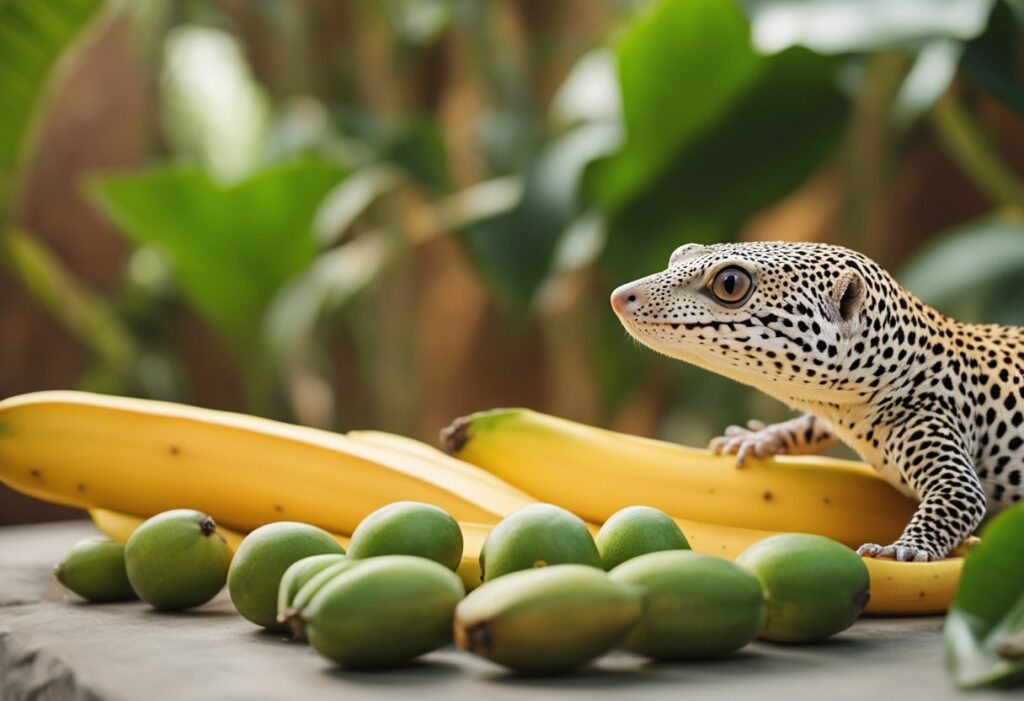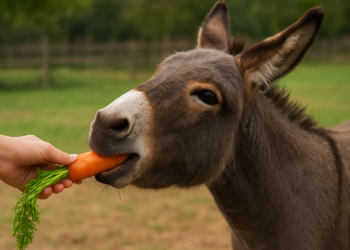Leopard geckos are fascinating creatures that are commonly kept as pets due to their easy-going nature and low maintenance requirements. As with any animal, it’s important to provide them with a balanced diet that meets their nutritional needs. While insects are the primary food source for leopard geckos, many pet owners wonder if they can supplement their diet with fruits.
When it comes to feeding leopard geckos, it’s important to remember that they are primarily insectivores. In the wild, they feed on a variety of insects, including crickets, mealworms, and waxworms. These insects provide the necessary protein, fat, and other nutrients that leopard geckos need to thrive. While fruits are a healthy addition to our diet, they are not a necessary component of a leopard gecko’s diet. In fact, some fruits can be harmful to leopard geckos if consumed in large quantities.
Leopard Gecko Dietary Basics

When it comes to feeding leopard geckos, it’s important to understand their dietary needs. Leopard geckos are insectivores, which means they primarily eat insects. They do not require fruits or vegetables in their diet, and in fact, feeding them these types of foods can cause digestive issues.
Leopard geckos require a diet that is high in protein and low in fat. Crickets, mealworms, and dubia roaches are all great options for feeding leopard geckos. It’s important to gut load these insects before feeding them to your gecko. This means feeding the insects a nutritious diet before feeding them to your gecko, which will provide your gecko with the necessary vitamins and minerals.
In addition to insects, leopard geckos also require access to fresh water at all times. A shallow dish of water should be provided in their enclosure, and the water should be changed daily. It’s important to use a dish that is shallow enough for your gecko to easily drink from, but not so deep that they could drown.
Overall, it’s important to stick to a diet of primarily insects for leopard geckos. Fruits and vegetables are not necessary and can even be harmful to their digestive system. Providing a balanced diet of gut-loaded insects and fresh water will help keep your leopard gecko healthy and happy.
The Role of Fruit in a Leopard Gecko’s Diet

Leopard geckos are insectivores, which means that their diet consists mainly of insects. However, some owners may wonder if they can supplement their gecko’s diet with fruits. In this section, we will discuss the role of fruit in a leopard gecko’s diet.
Nutritional Considerations for Leopard Geckos
Fruits are a good source of vitamins and minerals, which are important for a leopard gecko’s overall health. Some fruits, such as papaya and mango, are high in vitamin A, which is essential for good vision and a healthy immune system. Other fruits, like bananas and apples, are rich in potassium, which helps regulate blood pressure and support muscle function.
However, it is important to note that leopard geckos have specific nutritional requirements that must be met for optimal health. Their diet should consist primarily of insects, which provide the necessary protein and fat. Feeding too much fruit can upset the balance of their diet and lead to health problems.
Potential Health Risks of Feeding Fruit to Leopard Geckos
While fruits can provide some nutritional benefits, they can also pose some health risks to leopard geckos. Some fruits, such as citrus fruits, can be too acidic for their digestive system and cause gastrointestinal issues. Additionally, fruits that are high in sugar, such as grapes and melons, can lead to obesity and other health problems.
In conclusion, while fruits can provide some nutritional benefits, they should not be a significant part of a leopard gecko’s diet. Feeding too much fruit can upset the balance of their diet and lead to health problems. If you want to supplement your gecko’s diet with fruits, make sure to do so in moderation and choose fruits that are safe and appropriate for their digestive system.
Safe Fruits for Leopard Geckos
As obligate carnivores, leopard geckos do not require fruits as a part of their regular diet. However, fruits can be given occasionally as a treat and to provide variety in their diet. When considering fruits for your leopard gecko, it is important to choose safe options that will not harm their health. In this section, we will discuss the recommended fruits for leopard geckos and how to prepare them.
Recommended Fruits for Occasional Treats
The following fruits are safe for leopard geckos to eat in small amounts as an occasional treat:
- Mango
- Papaya
- Fig
- Blueberries
- Raspberries
These fruits are high in fiber, vitamins, and minerals that can benefit your leopard gecko’s health. However, it is important to note that fruits should not make up a significant portion of your leopard gecko’s diet. Too much fruit can cause digestive problems and lead to obesity.
Preparation of Fruits for Leopard Geckos
Before giving fruits to your leopard gecko, it is important to prepare them properly. Fruits should be washed thoroughly to remove any pesticides or other contaminants. They should also be cut into small, bite-sized pieces to make them easier for your leopard gecko to eat.
It is also important to remove any seeds or pits from the fruit, as these can be a choking hazard and may contain toxins. For example, the seeds of fruits in the Prunus family (such as cherries, peaches, and plums) contain cyanide and should never be given to leopard geckos.
In conclusion, while fruits are not a necessary part of a leopard gecko’s diet, they can be given as an occasional treat. When choosing fruits, it is important to select safe options and prepare them properly to ensure your leopard gecko’s health and safety.
Fruits to Avoid for Leopard Geckos

As much as we would like to offer our leopard geckos a variety of fruits, some of them can be harmful to their health. Here are some fruits that we should avoid feeding to our leopard geckos:
- Citrus fruits: Fruits such as oranges, lemons, limes, and grapefruits are too acidic for leopard geckos and can cause digestive problems.
- Avocado: Avocado contains persin, a toxin that can be fatal to leopard geckos.
- Rhubarb: Rhubarb contains oxalic acid, which can interfere with calcium absorption and lead to metabolic bone disease.
- Grapes and raisins: These fruits contain compounds that can be toxic to leopard geckos and cause kidney damage.
- Tomatoes: Tomatoes contain solanine, which can cause digestive problems and neurological issues in leopard geckos.
It is important to note that leopard geckos are insectivores and their diet should consist mainly of insects. Fruits should only be offered as occasional treats and should be cut into small pieces to prevent choking.
By avoiding these fruits, we can ensure that our leopard geckos stay healthy and happy.
Feeding Techniques and Frequency
Portion Control and Serving Size
When feeding leopard geckos fruits, it’s important to keep portion control in mind. Fruits should be given as treats and not as a staple food source. A good rule of thumb is to offer a small amount of fruit, about the size of the gecko’s head, once a week.
It’s also important to choose the right fruits to feed your leopard gecko. Fruits with high water content, such as citrus fruits, should be avoided as they can cause digestive issues. Instead, opt for fruits with a low water content, such as berries or melons.
Frequency of Fruit Feeding
As mentioned, fruits should only be given as treats and not as a staple food source. While it’s okay to offer a small amount of fruit once a week, it’s important not to overdo it. Too much fruit in a leopard gecko’s diet can lead to health issues such as obesity and digestive problems.
In addition to offering fruits as treats, it’s important to provide a balanced diet that includes insects and a calcium supplement. Insects should make up the majority of a leopard gecko’s diet, with fruits and vegetables being offered as occasional treats.
Overall, feeding leopard geckos fruits can be a fun and healthy addition to their diet when done in moderation. By keeping portion control and serving size in mind, as well as offering a balanced diet, you can ensure your gecko stays healthy and happy.
Alternatives to Fruits in a Leopard Gecko’s Diet
While leopard geckos can eat some fruits, it is important to note that their diet should primarily consist of insects and other protein-rich foods. In fact, most fruits are not a natural part of their diet in the wild, and feeding them too much fruit can lead to health problems.
Here are some alternative foods that can be included in a leopard gecko’s diet:
Vegetables
Vegetables are a great source of vitamins and minerals for leopard geckos. Some good options include:
- Carrots
- Squash
- Sweet potato
- Collard greens
- Kale
It is important to note that vegetables should be offered in moderation, as too much can lead to digestive issues.
Insects
As mentioned earlier, insects should make up the majority of a leopard gecko’s diet. Some good options include:
- Crickets
- Mealworms
- Dubia roaches
- Waxworms (as an occasional treat)
Make sure to dust the insects with calcium and vitamin D3 powder before feeding them to your leopard gecko.
Commercial Diets
If you are unable to provide a variety of insects or vegetables, there are commercial diets available that can supplement your leopard gecko’s diet. These diets are specifically formulated to provide the necessary nutrients for leopard geckos and can be found at most pet stores.
In conclusion, while some fruits can be included in a leopard gecko’s diet, it is important to focus on protein-rich foods such as insects and supplement with vegetables and commercial diets.
Understanding Leopard Gecko Food Preferences

Leopard geckos are insectivores, which means their diet consists mainly of insects. However, they can also eat some fruits, vegetables, and other plant-based foods. It is important to note that not all fruits and vegetables are safe for leopard geckos to eat.
Leopard geckos have specific food preferences, and it is essential to understand them to ensure they receive a balanced diet. They prefer live insects, such as crickets, mealworms, and waxworms. These insects provide the necessary protein and nutrients that leopard geckos need to thrive.
When it comes to fruits, leopard geckos can eat some fruits in moderation. However, it is important to avoid feeding them fruits that are high in sugar or acidic. Some safe fruits for leopard geckos include:
- Mango
- Papaya
- Kiwi
- Banana
It is essential to chop the fruits into small pieces to prevent choking and ensure easy digestion. Additionally, fruits should be fed as an occasional treat and not as a staple in their diet.
In conclusion, leopard geckos can eat some fruits, but it is important to understand their food preferences and avoid feeding them fruits that are high in sugar or acidic. Providing a balanced diet that consists mainly of live insects is crucial for their health and well-being.
Frequently Asked Questions
What alternative foods are safe for leopard geckos besides insects?
Leopard geckos are primarily insectivores, but they can also consume other foods to supplement their diet. Some safe alternatives to insects include pinkie mice, meal replacement powders, and gut-loaded insects. However, it is important to note that these foods should not replace insects entirely and should only be used as occasional supplements.
Are there any fruits that are safe for leopard geckos to consume?
Leopard geckos do not naturally consume fruits in the wild and are not adapted to digest them properly. Therefore, it is not recommended to feed them fruits as part of their regular diet. Fruits can cause digestive problems and may lead to health issues.
Can leopard geckos have vegetables as part of their diet, and if so, which ones?
Leopard geckos can consume some vegetables as part of their diet, but they should not make up a significant portion of their diet. Some safe vegetables for leopard geckos include carrots, squash, and sweet potatoes. However, these should be fed in moderation and should be chopped into small, bite-sized pieces.
Is it safe for leopard geckos to eat hornworms, mealworms, or nightcrawlers?
Hornworms, mealworms, and nightcrawlers are all safe for leopard geckos to consume. However, it is important to ensure that these insects are properly gut-loaded and dusted with calcium and other essential nutrients before feeding them to your gecko.
Are there any common household foods that leopard geckos can safely eat?
Leopard geckos should not be fed any common household foods as they are not adapted to digest them properly and may lead to health issues. It is best to stick to a diet of insects and occasional supplements.
What should be avoided when feeding leopard geckos to ensure their health?
Leopard geckos should not be fed any insects that are too large or too hard to digest, such as superworms or beetles. In addition, it is important to avoid feeding them insects that are wild-caught or may have been exposed to pesticides or other harmful chemicals. Finally, leopard geckos should not be overfed and should only be given the appropriate amount of insects based on their size and age.











